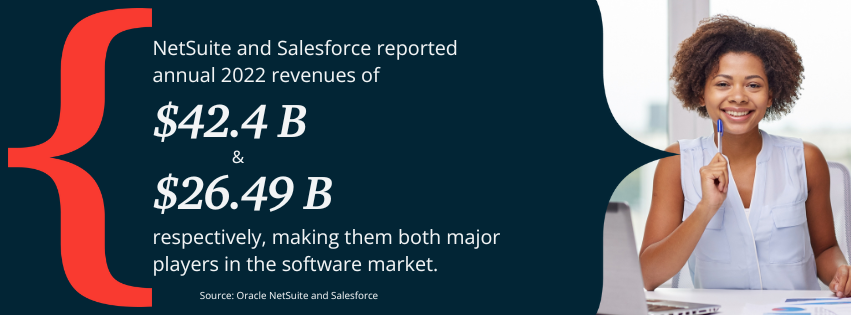NetSuite vs Salesforce: What's the Best CRM Solution for Your Company?
A quality customer relationship management system helps build trust within your target demographic so people come back for more. Still, you must find one that suits your needs without complicating internal processes.
Customer relationships fuel a company. A business with solid audience connections builds brand loyalty, encouraging repeat purchases and driving growth. Poor customer relationships, however, tanks an organization faster than a front-page scandal.
Effective customer relationship management (CRM) software gives your business the customer data necessary to create positive audience connections. It also offers tools that maintain those connections long-term. Many companies looking for the best CRM systems often choose between two major CRM players: NetSuite vs Salesforce.
Evaluating systems and finding the perfect fit for your company is always a challenge. A software purchase can often seem like a blind leap of faith. We know the feeling.
Fortunately, SuiteDynamics experts are happy to explain NetSuite's features and demonstrate its capabilities. They can even help you find a balance in the NetSuite vs Salesforce debate.
Read our system comparison below and schedule a free consultation today to start realizing your CRM potential.

Main Benefits of NetSuite vs Salesforce
NetSuite and Salesforce are excellent systems with robust CRM capabilities. However, a few factors make NetSuite stand out—particularly for companies already using the system.
NetSuite Has a Unified Platform
NetSuite is an enterprise resource planning (ERP) system that operates as a unified platform with a single database. This means customer relationship management, inventory management, marketing, human resources, finance, and other systems can pull information from the same source. This streamlined structure eliminates data silos and manual entry. The system also includes native analytic and reporting capabilities.
On the other hand, Salesforce is a dedicated customer relationship management (CRM) system. The Salesforce company has expanded the platform through acquisition to include billing, commerce, marketing, and more. However, customers must integrate these solutions with the main system, complicating the software. They must also use Tableau (a separate software solution) for reporting.
NetSuite Accommodates Multi-Subsidiary and Multi-Currency Functions
When considering NetSuite vs Salesforce, you must factor in the number of subsidiaries your company manages and any issues you’ll face with international accounting. NetSuite OneWorld allows companies to manage multiple subsidiaries, domestically and internationally. Customers can operate all entities from one system and enjoy a global business view.
OneWorld also supports 27 languages, 190 currencies, and pre-built localizations that keep customers tax-compliant in more than 110 countries. Users can also streamline their financial management by automating currency conversions, international tax calculations, and intra-company transactions.
However, Salesforce can accommodate some multi-subsidiary and multi-currency requirements, but it needs customization to do so.
NetSuite Requires Configuration, Not Customization, for Many Functions
As we said, NetSuite is an ERP that ties many solutions together and anchors them with a single database. Consequently, it offers more native functionalities, and a user can easily configure the system to include features like custom fields, flows, or reports. Salesforce is not a unified platform, so you need customization to enjoy similar benefits.
The term “configuration” refers to software setup, which you can accomplish without programming expertise. “Customization,” however, requires actual coding knowledge. Therefore, you can get more out of NetSuite without hiring a computer developer. That’s a major element of the NetSuite vs Salesforce debate.
You can see how easy it is to configure NetSuite during your free consultation with SuiteDynamics experts. You’ll also discover how efficient a unified platform can make your business, especially when subsidiaries are involved. Schedule your session today.
Get the Best of Both Worlds
Many companies still appreciate Salesforce, even though NetSuite is a more complete business solution. And we understand why.
Salesforce is a best-in-class CRM system that dominates the market. It handles complex CRM requirements and delivers additional software solutions through its Force.com platform.
On the other hand, the NetSuite ERP system has a robust CRM module that handles various needs. Still, it may not solve the most challenging customer relationship issues.
Many businesses are also familiar with Salesforce and like the software. So, they opt for its platform expansion and use Salesforce for billing, commerce, and marketing. Yet, as we said, the expanded platform requires multiple integrations, creating an overly complex system that requires programming expertise.
Fortunately, one solution offers the best of both worlds in the NetSuite vs Salesforce debate: a NetSuite/Salesforce integration.
Build Lasting Customer Relationships with a NetSuite/Salesforce Integration
A NetSuite integration incorporates a third-party application into the ERP system. This connection creates a path for free-flowing data that allows the two systems to work together.
A NetSuite/Salesforce integration manages end-to-end sales, marketing, and support processes. It offers users a thorough understanding of customers’ needs and helps companies build solid relationships with their target audiences. The integration includes several features that help streamline customer relationship management.
- Synchronized Data – Update information in one system, and it automatically transfers to the other, maintaining data accuracy.
- Improved Reporting – Use financial data from NetSuite to create reports in Salesforce.
- Improved Order Creation – Use Salesforce sales data to create invoices and orders in NetSuite.
- Cost Savings – Save time and money when you no longer need to manage two disparate systems.
- Better Teamwork – Improve collaboration by allowing finance and customer service departments to share data easily.
Schedule your free consultation and discover how a NetSuite/Salesforce integration can boost customer relationship management so your company can thrive.
What Does This Mean for You?
The right CRM software can help your company build concrete connections with customers that instill loyalty and strengthen your brand. It also uses customer data to improve every other aspect of your business. You just need to find the system that best suits your needs and goals.
That’s why you’ll probably end up debating the benefits of NetSuite vs Salesforce or opting for an integration.
We know it’s overwhelming to work through a system’s pros and cons and find the best software—especially when you have a business to run. Let us do the research for you.
Schedule a free consultation with SuiteDynamics experts. We’ll show you how a NetSuite ERP or NetSuite/Salesforce integration can smooth your CRM process and take your business to the next level.
We pull information from NetSuite material, SuiteDynamics experts, and other reliable sources to compose our blog posts and educational pieces. We ensure they are as accurate as possible at the time of writing. However, software evolves quickly, and although we work to maintain these posts, some details may fall out of date. Contact SuiteDynamics experts for the latest information on NetSuite ERP systems.












